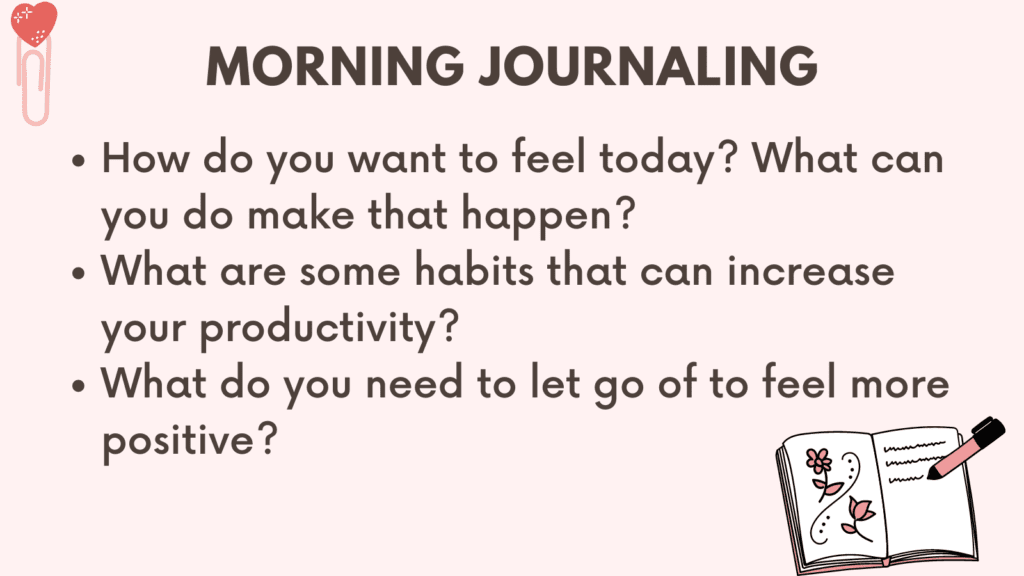This post contains some of the best therapeutic journal prompts.
Therapeutic Journal Prompts
1. Describe a recent situation that caused you stress or anxiety. How did you handle it, and what could you do differently next time?
2. Write about a positive experience from your past that brings you joy and gratitude.
3. What are three things you admire about yourself and why?
4. Reflect on a challenge you overcame in the past. What strengths did you discover about yourself during that experience?
5. Write a letter to your younger self, offering advice and encouragement.
6. Describe a recurring negative thought or belief you have about yourself. Challenge that belief and write a more balanced and positive alternative thought.
7. What are your top three values in life, and how do they guide your decision-making process?
8. Write about a mistake you made recently. What did you learn from it, and how can you grow from that experience?
9. List five things that make you feel calm and peaceful. How can you incorporate more of these activities into your daily routine?
10. Reflect on a difficult relationship in your life. What boundaries can you establish to improve the dynamic?
Related: Best 10 CBT Therapy Books
11. Write about a recent accomplishment you’re proud of. How did you overcome obstacles to achieve it?
12. Describe an activity or hobby that brings you great joy. How can you make more time for it in your life?
13. Reflect on a fear or insecurity you have. Explore the root cause of that fear and develop strategies to overcome it.
14. Write about a time when you felt truly heard and understood by someone. What made that experience so impactful?
15. List three things you need to forgive yourself for, and explore ways to offer self-compassion and move forward.
16. Describe a situation where you felt angry or frustrated. How could you communicate your needs assertively in the future?
17. Reflect on a goal you’ve been putting off. What steps can you take today to move closer to achieving it?
18. Write about a time when you felt overwhelmed by emotions. How did you cope with those intense feelings, and what could you do differently next time?
19. List five qualities or talents you possess that you sometimes overlook. How can you embrace and celebrate these attributes?
Related: Best 25 CBT Journal Prompts
20. Describe a situation where you felt anxious or worried. How can you practice mindfulness or grounding techniques to alleviate anxiety?
21. Reflect on a time when you felt rejected or excluded. How can you foster a sense of belonging and acceptance within yourself?
22. Write about a situation where you felt the need to set boundaries. How did it impact your relationship with others and yourself?
23. Describe a lesson you’ve learned from a past failure or setback. How has it shaped your growth and resilience?
24. List three small acts of self-care you can commit to every day to boost your overall well-being.
25. Reflect on a time when you experienced a significant loss or change. How did you navigate through the grieving process?
26. Write about a role model or mentor who has inspired you. What qualities do they embody, and how can you incorporate those qualities into your own life?
Related: Best 23 Therapist Gifts Ideas
27. Describe a time when you felt truly alive and fully present in the moment. What were the circumstances, and how can you cultivate more of those experiences?
28. Reflect on a time when you overcame a significant obstacle or challenge. How did you persevere and what did you learn from that experience?
29. Write about a situation where you felt vulnerable but found the courage to be authentic. How did it strengthen your relationships?
30. Reflect on a challenge you face in your current relationships. What skills or tools can you develop to improve communication and connection?
31. Reflect on a conflict you’re currently facing. What compromises or resolutions can you explore to find common ground?
32. Reflect on a person or relationship that drains your energy or brings negativity into your life. How can you set boundaries or minimize contact with that person?
33. Describe a situation where you experienced a lack of self-confidence. What positive affirmations can you repeat to yourself to build your self-esteem?
Related: What To Talk To Therapist About: Top 35 Topics
34. Write a letter to someone who has hurt you in the past, expressing your feelings and releasing any lingering resentment.
35. Reflect on a situation where you felt stuck and unable to make a decision. What strategies can you use to clarify your options and move forward?
36. Reflect on a time when you felt a strong sense of purpose or meaning in your life. What can you do to align your actions with your values?
37. Write about a time when you felt overwhelmed by self-doubt. What evidence can you gather to counteract those doubts and build self-confidence?
38. Describe a time when you supported a friend or loved one in their time of need. How did it make you feel to be there for them?
39. Reflect on a positive change you would like to see in your life. What action steps can you take to move closer to that change?
40. Write about a habit or behavior that you would like to change. How can you develop a plan for breaking that habit and replacing it with a healthier one?
Related: Top 100 Therapy Questions

How to Use Therapeutic Journal Prompts?
1. Create a Safe Space
Find a quiet and comfortable environment where you can focus without distractions.
This may be a private room, a cozy corner of your home, or even a peaceful outdoor setting.
Creating a safe space will allow you to feel more relaxed and open during the journaling process.
2. Set an Intention
Before you begin journaling, set an intention for your session.
What do you hope to achieve or explore?
It could be gaining insights into your emotions, understanding patterns of behavior, or finding strategies for managing stress.
Setting an intention will give your journaling practice a purpose and direction.
3. Choose a Prompt
Select a therapeutic journal prompt that resonates with you at the moment.
Consider your current emotional state, challenges you’re facing, or areas of personal growth you wish to explore.
Trust your intuition in choosing the right prompt for the day.
Related: FREE Therapy Journal Template
4. Start Writing
Begin by writing the prompt at the top of the page.
Take a few deep breaths to center yourself, and then let your thoughts flow freely. Write without judgment or self-censorship.
Allow your words to unfold naturally, exploring your thoughts, feelings, and experiences related to the prompt.
5. Dive Deep
As you write, go beyond surface-level responses.
Dive deep into your emotions, memories, and beliefs.
Reflect on the underlying causes or triggers for certain emotions or behaviors.
Challenge any negative thought patterns or self-limiting beliefs that come up.
6. Be Honest and Authentic
Journaling is a space for self-expression and self-discovery.
Be honest and authentic with yourself as you write.
Don’t worry about grammar, spelling, or writing style.
Focus on your innermost thoughts and emotions.
Remember, this is a private and non-judgmental space.
Related: Healing Isn’t Linear: What Does It Mean?
7. Reflect on Patterns
Regularly review your journal entries to identify recurring themes or patterns.
Notice if specific emotions, situations, or relationships are consistently present.
Understanding these patterns can provide valuable insights into your thoughts, feelings, and behaviors.
8. Identify Solutions and Strategies
Once you recognize patterns or areas of concern, brainstorm potential solutions or strategies.
Reflect on what changes you can make to improve your well-being and work towards personal growth.
Consider seeking professional help if necessary, as therapists can offer guidance and support.
9. Practice Self-Compassion
Throughout your journaling journey, practice self-compassion and kindness.
Treat yourself with gentleness and understanding, even when exploring challenging emotions or confronting difficult truths.
Use affirmations or positive self-talk to foster self-acceptance and resilience.
Related: How To Be Gentle With Yourself? Top 5 Ways To Practice Self-Compassion
10. Maintain Consistency
Make journaling a regular practice.
Set aside dedicated time each day or week to engage in this therapeutic process.
Consistency allows for deeper self-reflection and greater long-term benefits.
Aim for at least 10-15 minutes of uninterrupted writing each session.
11. Seek Professional Support if Needed
While therapeutic journaling can be beneficial, it is not a substitute for professional help.
If you find yourself struggling with intense emotions, unresolved trauma, or persistent mental health issues, consider reaching out to a licensed therapist or counselor for additional support.
Conclusion
Using therapeutic journal prompts can be a valuable tool for self-reflection, personal growth, and emotional well-being.
Feel free to adapt these suggestions to suit your preferences and needs.
The goal is to create a supportive space for self-exploration and growth. Happy journaling!



